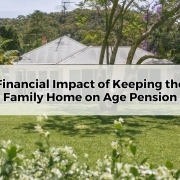Demystify Aged Care Financial Planning with Expert Advice
Table of Contents
ToggleShedding Light on Aged Care Financial Planning
Navigating the complexities of aged care financial planning can be daunting, but with expert advice, the path becomes clearer. Let’s explore key insights and recommendations to demystify this crucial aspect of retirement preparation.
Understanding the Basics of Aged Care Financial Planning
At its core, aged care financial planning involves preparing for the costs associated with long-term care as individuals age. This includes expenses for accommodation, personal care, and medical services. Understanding these fundamental principles is essential for effective financial planning.
Overcoming Common Challenges and Pitfalls in Aged Care Financial Planning
One common challenge in aged care financial planning is underestimating the potential costs involved. Many individuals fail to adequately plan for the expenses associated with aged care accommodation and support services, leading to financial strain later in life. Additionally, navigating the complex aged care system can be overwhelming, often resulting in confusion and frustration for both individuals and their families.
To overcome these challenges, it’s crucial to start planning early and seek professional guidance. By consulting with financial advisors and aged care specialists, individuals can gain a better understanding of their options and develop a comprehensive financial strategy tailored to their needs.
Another common pitfall is overlooking the importance of estate planning in aged care financial planning. Failing to establish a clear estate plan can lead to complications in asset distribution and may result in unnecessary taxes and fees. By addressing these issues proactively, individuals can ensure their assets are protected and their wishes are carried out according to their intentions.
Making Aged Care Financial Planning Understandable
Aged care financial planning often involves complex concepts and terminology that can be difficult to grasp. However, with the right guidance, these concepts can be clarified and understood more easily.
For example, understanding the various types of aged care accommodation, such as residential aged care facilities and home care packages, is essential for making informed decisions about long-term care options. Similarly, familiarising oneself with the financial implications of different aged care services, including means-tested fees and accommodation payments, can help individuals plan effectively for their future care needs.
Additionally, clarifying the role of government subsidies and financial assistance programs in aged care financial planning is crucial. Many individuals may be eligible for financial support through programs such as the Aged Care Pension or the Home Care Package Program, but navigating the application process can be complex. By seeking expert advice, individuals can ensure they receive the assistance they’re entitled to and optimize their financial resources for aged care.
In conclusion, demystifying aged care financial planning requires a comprehensive understanding of the basics, proactive strategies for overcoming challenges, and clear explanations of complex concepts. With expert advice and guidance, individuals can navigate this important aspect of retirement preparation with confidence and clarity.









